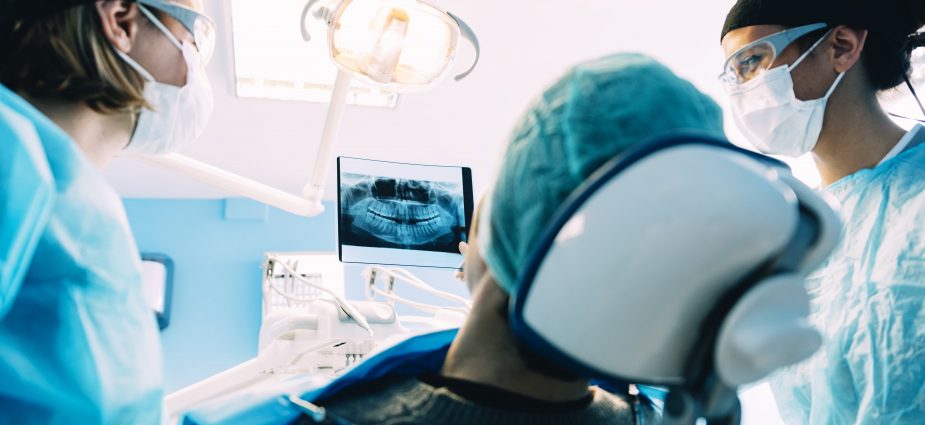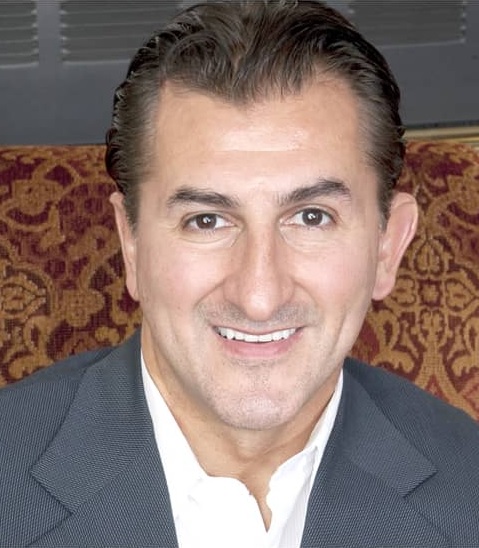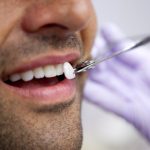Full Mouth Reconstruction
Medically Reviewed by: Dean Vafiadis, DDS

Full mouth reconstruction, rehabilitation and restoration are terms often used interchangeably to describe the process of rebuilding or simultaneously restoring all of the teeth in both the upper and lower jaws.
Full mouth reconstruction typically involves general or restorative dentists (performing procedures like crowns, bridges and veneers), and can incorporate dental specialists like periodontists (specializing in the gums), oral surgeons, orthodontists (specializing in tooth movements and positions) and endodontists (specializing in the tooth pulp).
The need for full mouth reconstruction may result from:
- Teeth that have been lost due to decay or trauma.
- Teeth that have been injured or fractured.
- Teeth that have become severely worn as a result of long-term acid erosion (foods, beverages, acid reflux) or tooth grinding.
- Ongoing complaints of jaw, muscle and headache pain requiring adjustments to the bite (occlusion).
How the Process Begins
If you think you need reconstruction, see your dentist for a comprehensive examination. Your dentist will examine your mouth to determine the extent of the problem and the treatment options that can be used to correct it. In particular, he or she will examine the condition of your:
- Teeth: The condition of your teeth will determine what restorative procedures may be needed, such as porcelain veneers or full-coverage crowns, inlays or onlays, bridges or implants restored with a crown. In particular, your dentist will make note of any cavities and decay, tooth wear, cracks, short/long teeth, root canal issues and any tooth movement.
- Periodontal (gum) tissues: If your gums are not healthy, you will most likely need scaling and root planing to treat periodontal disease. You may require more intensive treatments from a periodontist to ensure that your newly reconstructed teeth will have a solid foundation. Such treatments could involve soft tissue or bone grafts to build up your gums and underlying jaw bone. Your dentist will look for deep pockets, excessive or insufficient gum tissue, periodontal disease and bone density irregularities.
- Temporomandibular joints, jaw muscles and occlusion: A stable bite – one in which you are not in pain when you close your mouth or chew and one that does not cause wear or destruction of your teeth – is important to your overall oral health. Occlusal changes need to be taken into consideration when your dentist plans your restorations. In fact, you may require orthodontics or some other type of treatment (night guard or bite reprogramming orthotic) to correct occlusion before additional restorative procedures can be performed.
- Esthetics: The color, shape, size and proportion of your teeth, and how they appear in relation to your gums, lips, mouth, side profile and face, are also important factors in full mouth reconstruction.
The examination process requires records of your mouth, such as X-rays and photographs, impressions of your upper and lower teeth, models of your teeth that are made from the impressions and a model of your bite. Your dentist may also refer you to specialists (periodontist, orthodontist, oral surgeon) for a consultation in order to develop a treatment plan that is best for you.
Once your dentist has obtained all information relevant to your case, he or she will develop a comprehensive, step-by-step treatment plan to correct all of the problems in your mouth and complete your reconstruction. If you do not understand the procedure being described to you, ask for a detailed written description of the proposed treatment plan so you can review it. This can be helpful if you want to get a second opinion. Be sure you understand the risks and benefits of the recommended procedures and treatments.
What Procedures Are Needed?
Only your dentist and the team of specialists working on your full mouth reconstruction can determine what procedures are needed for your specific case. Other treatments may also be available, so ask your dentist about all possible procedures that might be required for your case and under what circumstances.
Most reconstructions involve multiple phases and office visits. It is not unreasonable to expect treatment to take 12 months or more, depending on your situation. The following procedures may be involved, depending on your needs:
- Prophylactic teeth cleaning and periodontal care (approximately $80, on average).
- Crown lengthening to expose healthy, sound tooth structure for possible crowns or bridges (approximately $550, on average).
- Orthognathic surgery to reposition the jaw.
- Contouring of the gum tissue to create balance and harmony in your smile.
- Preparation (reduction) of your natural tooth structure so crowns, bridges or veneers can be placed.
- Placement of temporary restorations so you can become accustomed to your new teeth and the feel of your new mouth or bite alignment.
- Placement of permanent restorations, such as crowns, veneers, inlays/onlays or bridges, made from ceramic, ceramic supported by metal or a combination of both.
- Orthodontics (braces) in order to move your teeth into the optimal position for reconstruction.
- Implant placement and restoration to replace missing teeth and/or anchor bridge restorations.
- Bone or soft tissue grafting to enhance the stability of your teeth, proposed implants and/or other restorations.
Full Mouth Reconstruction vs. Smile Makeover
How does full mouth reconstruction differ from smile makeover? A smile makeover is something that you elect to have performed, while a full mouth reconstruction is something that you need.
As the makers of dental materials respond to increasing consumer demands for beautiful, natural-looking dentistry, it is becoming hard to draw a line between purely “cosmetic” (such as elective) dentistry and “restorative” (necessary) dentistry. For example, it is now possible for your dentist to treat tooth decay with a tooth-like filling material that looks natural. If you need reconstruction, the materials available today make it possible for your dentist to provide you with durable, functional and clinically sound treatments that also look natural.
It is also important to note that a smile makeover – though performed primarily to improve the esthetic appearance of the smile – requires the use of clinically proven dental materials and treatment techniques, as well as exceptional knowledge, training and skill on the part of the dentist. Many of the same techniques and equipment used for full mouth reconstruction are also used to ensure the success and long-term stability of smile makeover treatments.
Costs and Insurance Coverage
Most full mouth reconstruction cases involve all teeth in the mouth, but every case is unique and depends on your clinical situation. The approximate cost (at a minimum) could be about $800 to $1,500 per tooth. That figure does not include any charges for oral surgery, crown lengthening, periodontal treatments, etc. It is not unreasonable to expect a reconstruction to cost approximately $30,000 to $45,000 or more.
Dental insurance may pay for some costs associated with full mouth reconstruction. This will depend on your diagnosis and the treatment plan your dentist has developed, as well as your dental insurance coverage. Third-party financing may be available through your dentist’s office to assist you in making affordable monthly payments.
About the Reviewer
 Dr. Dean Vafiadis is the founder of New York Smile Institute, a premier Manhattan dental studio devoted to restoring and enhancing the natural beauty of the smile using conservative, state-of-the-art practices. Dr. Dean is an Associate Professor of Prosthodontics at NYU College of Dentistry and serves as the Director of the Full-Mouth Rehabilitation CE course at NYU. He lectures nationally and internationally on various topics such as Aesthetics, implant designs, computer restorations, ceramic materials, occlusion and more. Learn More
Dr. Dean Vafiadis is the founder of New York Smile Institute, a premier Manhattan dental studio devoted to restoring and enhancing the natural beauty of the smile using conservative, state-of-the-art practices. Dr. Dean is an Associate Professor of Prosthodontics at NYU College of Dentistry and serves as the Director of the Full-Mouth Rehabilitation CE course at NYU. He lectures nationally and internationally on various topics such as Aesthetics, implant designs, computer restorations, ceramic materials, occlusion and more. Learn More






